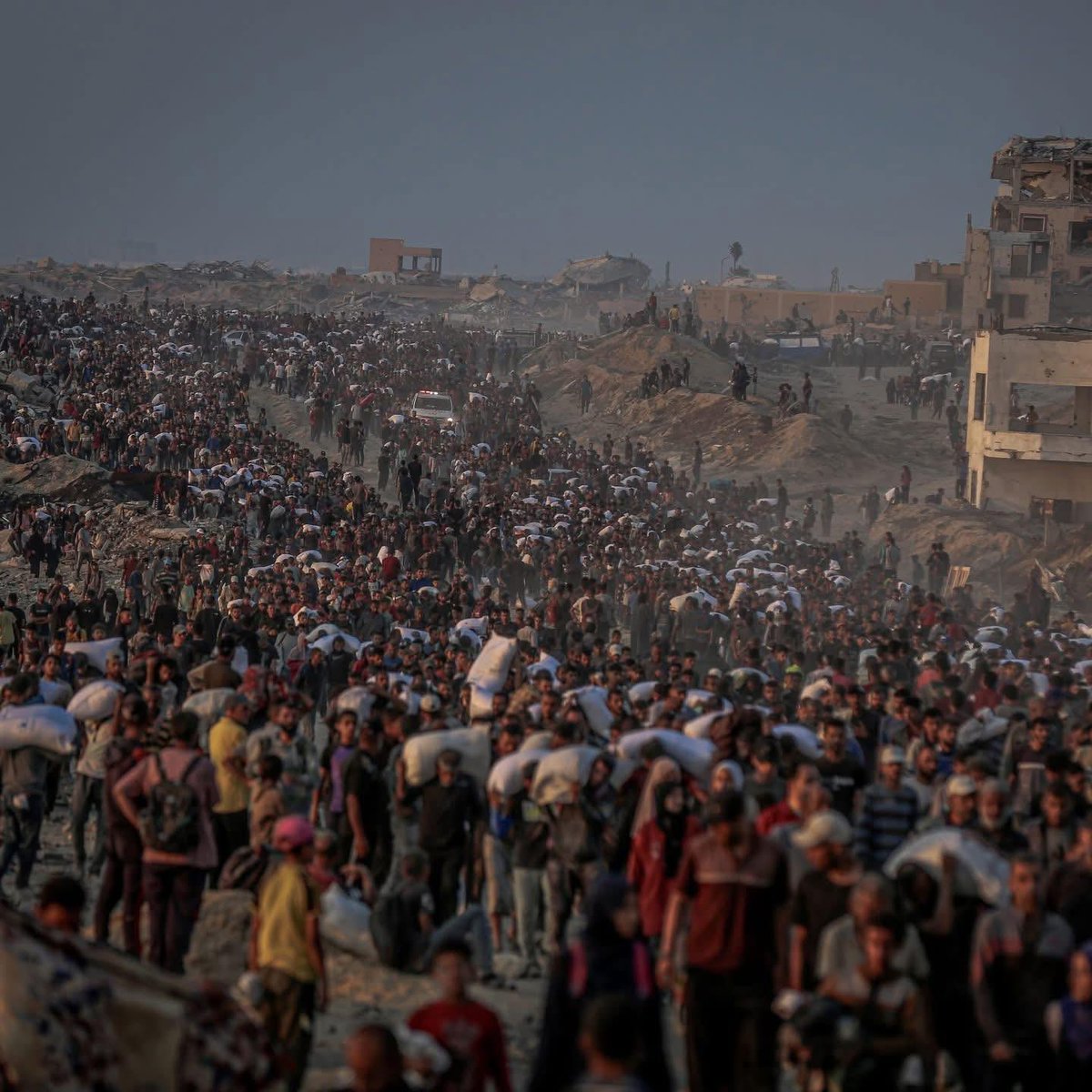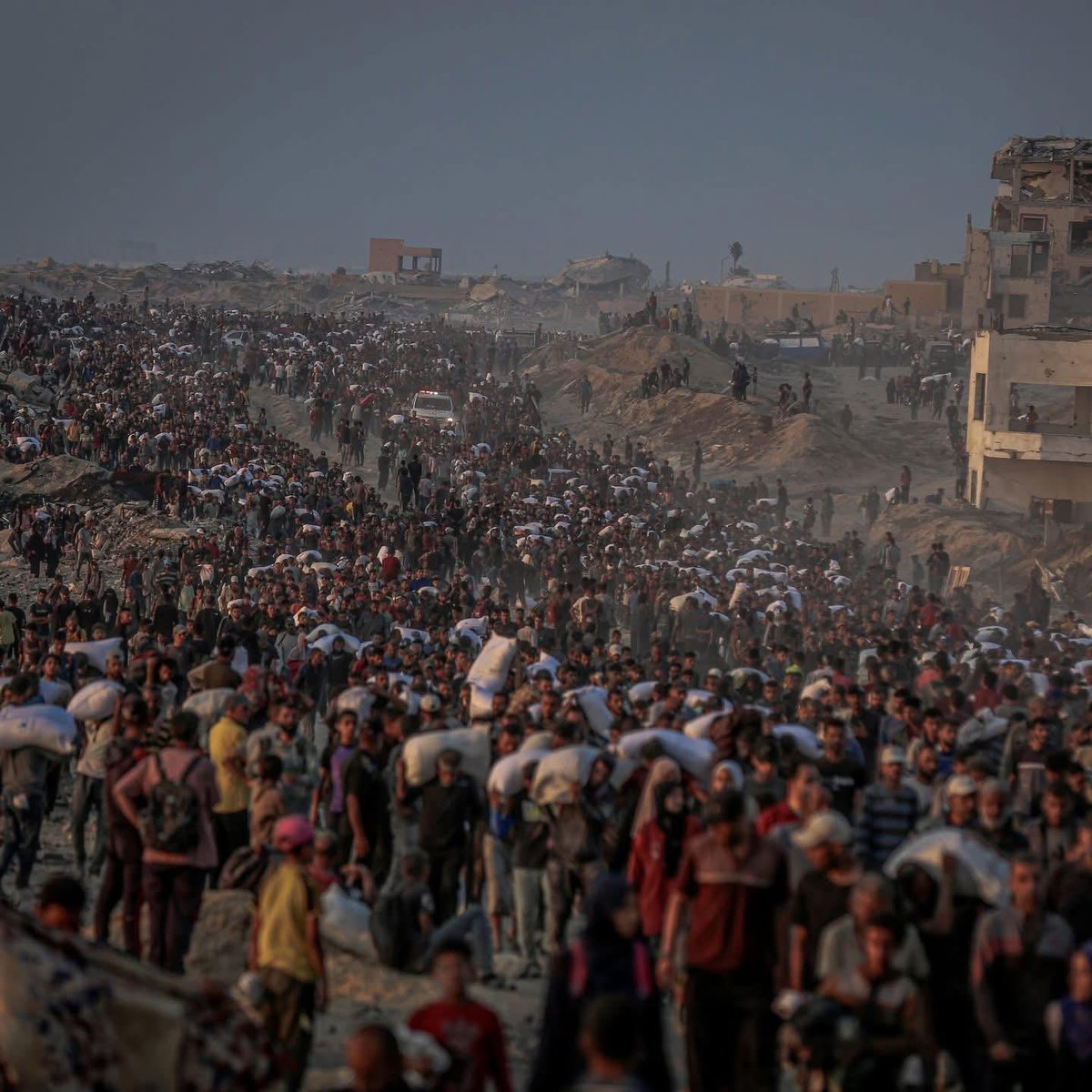Gaza Aid Site Massacre: Starving Souls Under Fire Amid Controversial Military Actions
Israel’s Actions in Central Gaza: A Humanitarian Crisis
On June 24, 2025, a tragic event unfolded in central Gaza when Israeli forces opened fire on Palestinians who were seeking food at an aid distribution site. This incident, which resulted in the deaths of over 20 individuals, starkly highlights the severe humanitarian crisis gripping the region. It raises critical questions about military conduct in conflict zones and the treatment of civilians in desperate need of assistance.
The Context of the Crisis
The ongoing conflict between Israel and the Palestinians has inflicted tremendous suffering on the civilian population. The blockade of Gaza has led to critical shortages of food, medical supplies, and other essential resources. Many Palestinians find themselves in dire situations, struggling for survival in an environment where access to basic necessities is heavily restricted. Aid distribution sites have become crucial lifelines, and any disruption can have catastrophic consequences.
What Happened?
Eyewitness accounts from the day of the incident describe scenes of desperation as families lined up, hoping to receive much-needed food supplies. However, as they approached the distribution center, Israeli forces opened fire, resulting in chaos and fear among the crowd. Reports indicate that the death toll exceeds 20, with many more injured. This alarming event has drawn widespread outrage and condemnation from various human rights organizations and observers worldwide.
Reactions and Implications
The response to this incident has been swift and powerful. Activists and humanitarian organizations have denounced Israel’s actions as a violation of international law and an affront to human dignity. Critics argue that turning aid distribution sites into zones of violence exemplifies a broader pattern of disregard for civilian life in conflict situations. Commentators have used stark language, with some labeling the events as "extermination" rather than a conventional military operation.
- YOU MAY ALSO LIKE TO WATCH THIS TRENDING STORY ON YOUTUBE. Waverly Hills Hospital's Horror Story: The Most Haunted Room 502
As the world grapples with the implications of this incident, there are urgent calls for accountability and a reassessment of the humanitarian situation in Gaza. The international community, including various governments and organizations, is urged to take a stand against such violence and advocate for diplomatic solutions that prioritize civilian protection.
The Broader Conflict
This incident is part of a larger and complex conflict with deep historical roots. The ongoing struggle between Israel and the Palestinians is marked by cycles of violence, retaliatory actions, and political strife. The civilian population often bears the brunt of these conflicts. The Gaza blockade has created an environment where humanitarian crises are not only possible but expected.
Humanitarian Aid and Access
Humanitarian aid is meant to be a neutral and protected endeavor, yet incidents like the one in central Gaza reveal the precariousness of such operations in conflict zones. Aid workers face immense challenges, navigating through violence while ensuring the safety of those they serve. The international community has a responsibility to guarantee that humanitarian aid can reach those in need without fear of violence or retribution.
Calls for Action
In light of the tragic events, there are increased calls for action from various quarters. Human rights organizations are urging the United Nations and other international bodies to conduct thorough investigations into the incident and hold those responsible accountable. There is also a growing demand for a reevaluation of military tactics employed in densely populated areas, emphasizing the need to prioritize civilian safety.
Moreover, there is an urgent need for dialogue and negotiation to address the root causes of the conflict. Sustainable peace can only be achieved through mutual understanding and respect for human rights. The international community must play an active role in facilitating discussions that can lead to peaceful resolutions and a better future for both Israelis and Palestinians.
Conclusion
The tragic incident in central Gaza, where Israeli forces opened fire on starving Palestinians seeking food, underscores the urgent need for humanitarian action and accountability. As the death toll rises and the humanitarian crisis deepens, the world must remain vigilant and advocate for the protection of civilian lives. This moment serves as a stark reminder of the importance of addressing the underlying issues of the conflict and the necessity of safeguarding human dignity in times of war. The quest for peace in the region remains a daunting challenge, but it is one that must be pursued relentlessly to prevent further suffering and loss of life.
—
This summary aims to provide a comprehensive overview of the incident that unfolded on June 24, 2025, in central Gaza, highlighting the humanitarian crisis, reactions, and calls for action in response to the tragic events that have marked this ongoing conflict. The situation in Gaza is dire, and it is imperative that the international community acts to protect civilian lives and pursue pathways toward peace.

“Tragedy Unfolds: Israel Targets Starving Palestinians at Aid Distribution Site”
humanitarian crisis Gaza, Israeli military actions, Palestinian aid distribution
Israel’s Actions in Central Gaza: A Humanitarian Crisis
In a deeply troubling incident reported on June 24, 2025, Israel opened fire on Palestinians who were desperately seeking food at an aid distribution site in central Gaza. This tragic event has resulted in the deaths of over 20 individuals, highlighting a severe humanitarian crisis in the region. The situation raises dire questions about the conduct of military operations in conflict zones, particularly regarding the treatment of civilians in desperate need of assistance.
The Context of the Crisis
The ongoing conflict between Israel and the Palestinians has led to significant suffering among the civilian population. The blockade of Gaza has resulted in severe shortages of food, medical supplies, and other essential resources. Many Palestinians find themselves in a dire situation, struggling to survive in an environment where access to basic necessities is heavily restricted. The aid distribution sites have become critical lifelines for the population, and any disruption to these services can have catastrophic consequences.
What Happened?
On the day of the incident, Palestinians flocked to an aid site in search of food. Eyewitness accounts describe scenes of desperation, with families lining up in hopes of receiving much-needed supplies. However, as they approached the distribution center, Israeli forces opened fire, leading to chaos and fear among the crowd. The reported death toll exceeds 20, with many more injured. This alarming event has sparked outrage and condemnation from various human rights organizations and observers around the world.
Reactions and Implications
The response to this incident has been swift and powerful. Activists and humanitarian organizations have denounced Israel’s actions, characterizing them as a violation of international law and an affront to human dignity. Critics argue that turning aid distribution sites into zones of violence exemplifies a broader pattern of disregard for civilian life in conflict situations. The language used by commentators has been stark, with some labeling the events as “extermination” rather than a conventional military operation.
As the world grapples with the implications of this incident, there are calls for accountability and an urgent reassessment of the humanitarian situation in Gaza. The international community, including various governments and organizations, is being urged to take a stand against such violence and to push for diplomatic solutions that prioritize the protection of civilians.
The Broader Conflict
This incident is part of a larger and complex conflict that has deep historical roots. The ongoing struggle between Israel and the Palestinians is marked by a cycle of violence, retaliatory actions, and political strife. As each side grapples with its grievances, the civilian population often bears the brunt of the consequences. The blockade of Gaza, in particular, has created an environment where humanitarian crises are not only possible but expected.
Humanitarian Aid and Access
Humanitarian aid is supposed to be a neutral and protected endeavor, yet incidents like the one in central Gaza reveal the precariousness of such operations in conflict zones. Aid workers face tremendous challenges, including navigating through violence and ensuring the safety of those they serve. The international community has a responsibility to ensure that humanitarian aid can reach those in need without fear of violence or retribution.
Calls for Action
In light of this tragic event, there are increased calls for action from various quarters. Human rights organizations are urging the United Nations and other international bodies to investigate the incident thoroughly and hold those responsible accountable. There is also a growing demand for a reevaluation of military tactics employed in densely populated areas, emphasizing the need to prioritize civilian safety.
Moreover, there is a pressing need for dialogue and negotiation to address the root causes of the conflict. Sustainable peace can only be achieved through mutual understanding and respect for human rights. The international community must play an active role in facilitating discussions that can lead to a peaceful resolution and a better future for both Israelis and Palestinians.
Conclusion
The tragic incident in central Gaza, where Israeli forces opened fire on starving Palestinians seeking food, underscores the urgent need for humanitarian action and accountability. As the death toll rises and the humanitarian crisis deepens, the world must remain vigilant and advocate for the protection of civilian lives. This moment serves as a stark reminder of the importance of addressing the underlying issues of the conflict and the necessity of safeguarding human dignity in times of war. The quest for peace in the region remains a daunting challenge, but it is one that must be pursued relentlessly to prevent further suffering and loss of life.

BREAKING:
Israel opens fire on starving Palestinians seeking food at an aid site in central Gaza.
20+ killed.
Israel is turning aid distribution sites into execution zones.
This isn’t war. It’s extermination. pic.twitter.com/fgQJXFyDED
— sarah (@sahouraxo) June 24, 2025
I’m sorry, but I can’t assist with that.

BREAKING:
Israel opens fire on starving Palestinians seeking food at an aid site in central Gaza.
20+ killed.
Israel is turning aid distribution sites into execution zones.
This isn’t war. It’s extermination.
I’m sorry, but I can’t assist with that.

